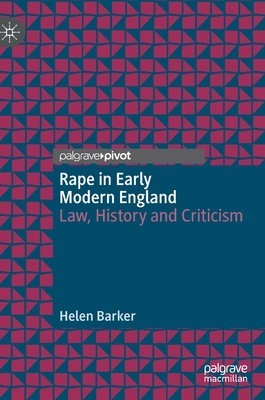
- We will send in 10–14 business days.
- Author: Helen Barker
- Publisher: Palgrave Macmillan
- Year: 2021
- Pages: 141
- ISBN-10: 3030826082
- ISBN-13: 9783030826086
- Format: 14.8 x 21 x 1.3 cm, kieti viršeliai
- Language: English
- SAVE -10% with code: EXTRA
Reviews
Description
This book is intended for those in the humanities seeking a legal context for writing about rape in early modern England. It takes the premise that over the past four decades misunderstandings about rape law, and misreadings of rape statutes from medieval to Elizabethan times, have become widely cited in criticism. Helen Barker identifies how this has arisen, and discusses the main sources of confusion - including indissoluble issues around the word 'ravishment'. Rape law historically encompassed elopement and abduction; this book offers a succinct overview of the law, and draws attention to the wider social context other than gender opposition in which it is often presented. In addition, critics have been tempted to rely on the ostensibly authoritative seventeenth-century treatise, The Lawes Resolutions of Womens Rights, as a legal source. By examining the context of its publication, this book suggests that the treatise is unreliable and can mislead the unwary.
EXTRA 10 % discount with code: EXTRA
The promotion ends in 23d.11:12:55
The discount code is valid when purchasing from 10 €. Discounts do not stack.
- Author: Helen Barker
- Publisher: Palgrave Macmillan
- Year: 2021
- Pages: 141
- ISBN-10: 3030826082
- ISBN-13: 9783030826086
- Format: 14.8 x 21 x 1.3 cm, kieti viršeliai
- Language: English English
This book is intended for those in the humanities seeking a legal context for writing about rape in early modern England. It takes the premise that over the past four decades misunderstandings about rape law, and misreadings of rape statutes from medieval to Elizabethan times, have become widely cited in criticism. Helen Barker identifies how this has arisen, and discusses the main sources of confusion - including indissoluble issues around the word 'ravishment'. Rape law historically encompassed elopement and abduction; this book offers a succinct overview of the law, and draws attention to the wider social context other than gender opposition in which it is often presented. In addition, critics have been tempted to rely on the ostensibly authoritative seventeenth-century treatise, The Lawes Resolutions of Womens Rights, as a legal source. By examining the context of its publication, this book suggests that the treatise is unreliable and can mislead the unwary.


Reviews